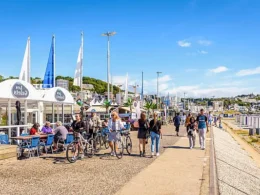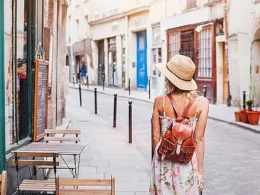Medieval fairs in French villages are a cherished tradition that dates back to the Middle Ages. These fairs, often held in picturesque settings, offer a unique opportunity to experience the customs and culture of times gone by.
The fairs showcase a rich tapestry of medieval history, featuring traditional crafts, entertainment, and culinary delights. Visitors are immersed in a bygone era, surrounded by the sights, sounds, and aromas of a historical marketplace. From artisans demonstrating age-old techniques to the tantalizing array of local delicacies, the fairs provide a window into the vibrant heritage of French village life.
This introduction delves into the allure of these fairs, where the past comes alive in a celebration of tradition and community.
The History of Medieval Fairs
The origins of medieval fairs can be traced back to the commercial and social activities of medieval European communities. These fairs held historical significance as they provided a vital platform for trade and commerce during the Middle Ages.
The economic impact of these fairs was profound, as they facilitated the exchange of goods, services, and ideas, contributing to the economic development of the regions where they were held. The fairs also served as a meeting point for people from different areas, fostering cultural exchange and social interaction.
The historical significance of medieval fairs lies in their role as catalysts for economic growth and cultural integration, shaping the social and economic landscape of medieval Europe. Understanding their historical importance sheds light on the evolution of trade and communal ties in the medieval period.
Highlights of French Village Fairs
Originating in medieval times, French village fairs were integral to the economic and cultural fabric of the region, serving as vibrant hubs for trade, social interaction, and cultural exchange.
The highlights of French village fairs include:
- Traditional Music: The fairs are filled with the melodious tunes of traditional French music, creating a lively and authentic atmosphere.
- Festive Atmosphere: The fairs exude a joyful and celebratory ambiance, attracting locals and tourists alike to partake in the merriment.
- Culinary Delights: Visitors can indulge in a wide array of delectable traditional French dishes, showcasing the rich culinary heritage of the region.
- Artisanal Crafts: Skilled artisans showcase their craftsmanship, offering a diverse range of handmade goods, from pottery to textiles.
- Entertaining Performances: The fairs feature entertaining performances, such as street theater and dance, adding to the overall festive experience.
Experiencing Traditional Crafts and Entertainment
Experiencing traditional crafts and entertainment at these fairs provides visitors with an immersive glimpse into the rich cultural heritage of French villages. Traditional music fills the air, transporting visitors back in time as they wander through the lively stalls and performances.
Artisan workshops offer hands-on experiences, allowing visitors to witness the skill and dedication required for traditional crafts such as pottery, woodworking, and weaving. Visitors can engage with artisans, learning about the techniques and history behind these crafts. The atmosphere is further enriched by live demonstrations of age-old craftsmanship, providing an authentic and educational experience.
Additionally, traditional entertainment such as storytelling, puppet shows, and medieval games offer a delightful insight into the leisure activities of the past, ensuring an unforgettable and enriching visit for all.
Navigating the Culinary Delights
Amidst the traditional crafts and entertainment, visitors can indulge in the culinary delights of French village fairs, experiencing an array of savory and sweet delicacies that showcase the rich gastronomic heritage of the region. From local delicacies to classic French cuisine, the fair offers a feast for the senses, allowing visitors to immerse themselves in the flavors of the medieval era.
Visitors can savor:- Crispy and golden crepes filled with delicious combinations such as Nutella, fresh fruits, or savory ham and cheese.- Fragrant and buttery escargot, a French delicacy cooked with garlic and parsley.- Fluffy and flavorful quiche Lorraine, a savory pie filled with cheese, bacon, and a creamy custard.- Rich and creamy French onion soup topped with melted Gruyère cheese and a crusty baguette.- Sweet and aromatic pain perdu, a French toast made from thick slices of brioche soaked in a mixture of eggs, milk, and vanilla, then fried to golden perfection.
Frequently Asked Questions
Are There Any Specific Rules or Regulations for Participating in the Medieval Fairs in French Villages?
When participating in medieval fairs in French villages, it’s crucial to adhere to costume requirements and pay attention to participation fees. Additionally, vendors must comply with food regulations while providing diverse entertainment options for attendees.
What Are Some Tips for Finding the Best Accommodations Near the Fairgrounds?
When seeking accommodations near fairgrounds, consider proximity, amenities, and local cuisine options. Research nearby hotels, B&Bs, or vacation rentals, and read reviews for insights. Look for accommodations that offer easy access to the fairgrounds and local dining options.
Are There Any Opportunities for Visitors to Interact With Local Artisans and Performers Outside of the Scheduled Events?
Opportunities for visitors to interact with local artisans and performers outside of scheduled events are abundant. Engage in interactive experiences through artisan demonstrations, explore local craftsmanship, and enjoy performer engagement, creating a rich and immersive cultural experience.
How Do the Medieval Fairs in French Villages Contribute to the Preservation of Traditional Cultural Practices?
Preservation of traditional cultural practices is vital for maintaining heritage. Participation in cultural events fosters a sense of community and identity. Accommodations for showcasing artisans and performers provide a platform for passing on valuable traditions to future generations.
Are There Any Lesser-Known Medieval Fairs in Remote French Villages Worth Exploring?
Certainly, exploring remote villages in France can lead to discovering lesser-known medieval fairs. These fairs offer historical reenactments, cultural immersion, traditional crafts, and artisan interactions, providing a unique and authentic experience for those seeking to delve into France’s rich cultural heritage.










